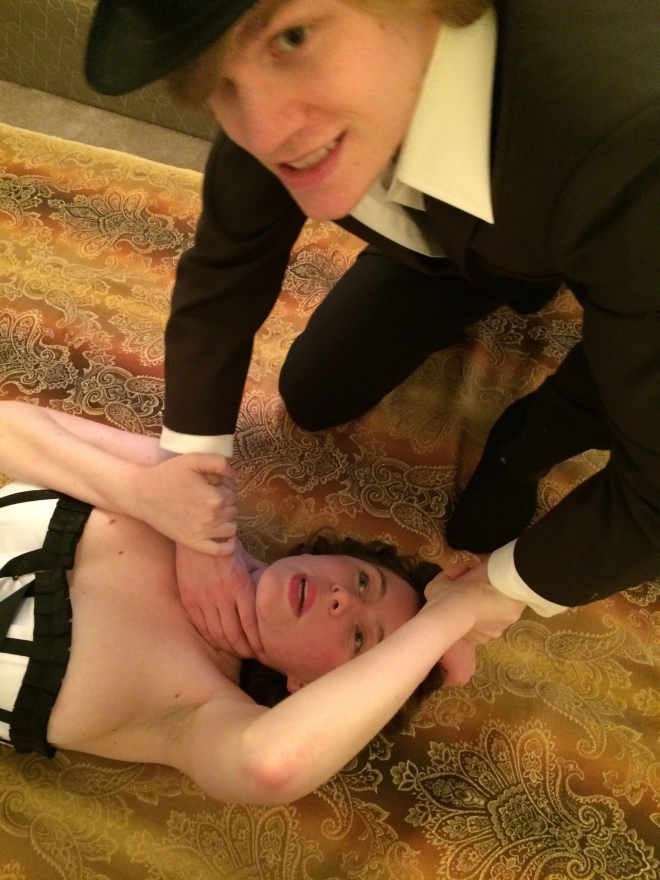Oliver Twist, Charles Dickens, 1838
I read Oliver Twist as rapidly as I read The Hunger Games. That’s how caught up I was in the plot of Oliver Twist. Dickens creates a web of immoral, malicious schemers around his sweet, innocent protagonist. Oliver is a bright light in a dark, sordid world. I was driven to keep reading by a sense that danger lurked behind every lamppost. I needed to know if Oliver would escape the traps laid for him or be irrevocably lost to a life of crime.
I’ve noticed that morally ambiguous characters with complex, ever-changing personalities are popular in contemporary TV, movies and novels. You won’t find that in Oliver Twist. Oliver is completely good and naïve. Bill Sykes the housebreaker is coarse, self-interested and mean. Each character stays true to a relatively simple set of traits. Which is fine, because this is a plot driven novel and the seedy underbelly of London provides ample space for the characters to interact with each other in complex ways.
The only personage who shows any character development is Nancy, literature’s first tart-with-a-heart. I’m pretty sure about that. Oh, wait. Mary Magdalene? Anyway, Nancy starts to lose her loyalty to her little gang of criminals. Unlike the rest of that gang, she starts to act selflessly. Nancy’s attempts to find a semblance of love and morality in her dark, dysfunctional world are more pitiable even than Oscar’s trials as a beleaguered orphan on the streets of London.
Overall, I loved reading Oliver Twist and I heartily recommend it. I did have two problems with it; one major and one minor. The anti-Semitism in this book hit me like a punch in the gut every 50 pages or so. The character Fagin is depicted as a greedy, cowardly, deceitful, hook-nosed Jew worthy of the utmost scorn. Dickens rarely uses Fagin’s name, but refers to him instead as “the Jew.” Dickens describes Fagin as more of an animal than a man.
Proof:
“The mud lay thick upon the stones, and a black mist hung over the streets; the rain fell sluggishly down, and everything felt cold and clammy to the touch. It seemed just the night when it befitted such a being as the Jew to be abroad. As he glided stealthily along, creeping beneath the shelter of the walls and doorways, the hideous old man seemed like some loathsome reptile, engendered in the slime and darkness through which he moved: crawling forth, by night, in search of some rich offal for a meal.”
Doesn’t that just turn your stomach? Worthy of the pages of Mein Kampf. When I came to passages like this, I felt like a terrible person for enjoying other parts of this book.
My other, much less disturbing complaint about Oliver Twist is classism. The implicit reason that Oscar is able to stay good and pure throughout his trials and in spite of his exposure to corrupted people like Sykes and Fagin is the genteel blood secretly coursing through his veins. How silly of Dickens to think that a well-born mother can save a child from perdition when the mother died in childbirth and cannot influence the child. Oh well, if there’s one thing the British gentility are good at, it’s thinking well of themselves.
You might like Oliver Twist if:
- You like your novels to have plot, tension and a sense of urgency.
- You don’t mind well-worded if long-winded descriptions of setting and characters interspersed with your urgent, tense plot movement.
You might not like Oliver Twist if:
- You like a lot of character development in your novels.
Final Thoughts: I love Nancy. The fallen woman, forced by poverty into bad company. Her sad, misguided attempts to find affection and worthiness in her dark world will break your heart. In a good way. The way literature should.



Oscar?
Y’all are correct. I wrote Oscar when I meant to type Oliver.
I was wondering about that myself….
orphans uncorrupted by evil! tonight, on sick sad world.